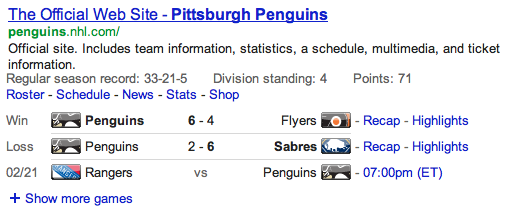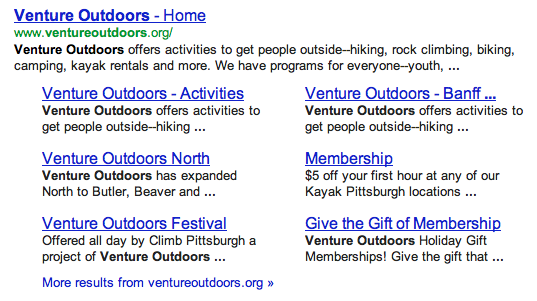Google, Entities, & Attributes: The Future Of Search
In his recent Mashable article, Lance Ulanoff detailed a long conversation with Google Fellow and SVP, Amit Singhal, in which the two of them discussed Google’s growing knowledge graph, entity-based search, and the implications for artificial intelligence. Needless to say, it was quite the eye-opener. While you really do owe the original a read, I’ll provide a brief synopsis before getting along with the editorial portion of this post. Let’s have at it.
The Concept of Entities
What is an entity in terms of search? Well, let’s take the search query ‘Pittsburgh Penguins’, for instance. Before Pittsburgh’s professional hockey team established a significant web presence, the aforementioned string might have yielded some pretty interesting results. The term ‘Pittsburgh’ is uniformly a geo-modifier – indicative of geographic location or city affiliation across the board. But what about ‘Penguins’? The cute, tuxedo-wearing, flightless birds that populate Antarctica and our favorite zoo attractions – right? Well, while that’s probably the most popular interpretation, the scope of this term is not so limited.
Be it a tribute to the tendencies of sports team nomenclature or a natural proclivity, we humans love to name things for our animal friends. The penguin is no exception. While ‘Penguins’ is merely a plural noun, conceptualization yields plenty of ambiguity. Aside from the pudgy, cold-weather birds and a professional hockey team, ‘Penguins’ takes the form of a soulful blues band and Youngstown State’s college mascot, among other things. Animals. Professional sports teams. Bands. College mascots. These things, my friends, are what Google calls ‘entities’.

What’s different about entity-based search, though? Good question. Let’s take a look at our example. The first result for the query ‘Pittsburgh Penguins’ is displayed above. Alas, the beauty of entity-based search has already made its mark. As is outlined in Ulanoff’s article, defining a particular entity (such as a professional hockey team) allows Google to collect and display in its results information pertinent to specific items within that subset. The items, in our case, are the individual professional hockey teams. The pertinent information is comprised of records, standings, points, recent game scores, etc. All right there in the results – not a single click needed. Pretty cool, huh?
Talking to Google
As Google’s knowledge graph grows, so does the likelihood that we’ll see more and more entity-based search results in the near future. While you don’t have total control of the information that appears in these results (for, say, your website), you are responsible for providing as much valid, pertinent, and disclosable information as possible. In the above example, Google displays all of this awesomely current information about the Pittsburgh Penguins because it suspects that someone searching for the team will find this information useful. Built into the string ‘Pittsburgh Penguins’ might be the underlying questions that users ask indirectly when entering this query and others like it. Interrogatives like: “Where do the Pens rank in the Atlantic division standings?” “What was the score of yesterday’s Pens game?” “When is the next Pens game?” You get the idea. With the advent of entities, Google is able to respond to these questions better than ever – and directly in the search results.

The information must be available, though. Let’s take a look at another example – one (like most) whose results have not yet been exposed to Google’s Artificial Intelligence. Nonprofits. We’ll be looking specifically at Venture Outdoors, a Pittsburgh nonprofit that works to create programs and events to get people outside. Given the proximity of LunaMetrics SEO Training Day at the 2012 Nonprofit Technology Conference, I daresay that this is a timely example. Anyways, back to the information! In order for Google to display entity-based attributes in its results, the information behind these attributes must be available online from a trusted source. While the trusted source is pretty clear-cut in our former example (the Penguins’ subdomain on NHL.com/NHL.com itself), does something like this exist for nonprofits? Well, yes . . . hopefully.
If your nonprofit does not yet have a website, the time is now. Aside from all of the known benefits of establishing a web presence, your website acts as an information hub for not just users, but search engines and information aggregators, as well. The people at Venture Outdoors, through their website, are able to provide users with a boatload of pertinent information. Users can sign up to become members, read a community blog, learn about the company, etc. Search engines like Google get plenty of information, too. Be it the sitelinks in the primary result (shown above) or the contact information (address, phone number, etc.) shown in the Places results, Google can draw this information directly from the website or use text on the website to triangulate it – ensuring its validity. It is my guess that the information-gathering process for entity-based search will function similarly – through trusted information hubs and mass triangulation. If something is consistently attributed to a given item across the web – much like a single phone number or address – it makes sense that that information is deemed more reliable.
The ‘Nonprofit’ Entity
Okay, so we know what entity-based attributes look like for a professional hockey team, but what about nonprofits? What are the underlying questions users are asking when they type ‘Venture Outdoors’ into the Google search bar? While I’d wager a guess that some long-term analytics might reveal questions that are specific to this nonprofit, I’m more focused on the questions that apply to every nonprofit. While a lot of the static information can be covered in the description and Places results (like address, phone number, brief mission summary, etc.), I’m a big fan of the dynamic side of things. In our previous example, the majority of the result was current and generated dynamically! Scores. Schedule. Standings. How far we’ve come!

Until the nonprofit entity has defined attributes, we can only speculate. So speculate I will. When I search for Venture Outdoors and other nonprofits, one of the underlying questions in my mind is commonly something like, “What events is this nonprofit holding in the near future and when are they?” Seems reasonable, right? Events seem to be a pretty integral part of the nonprofit space, so why not give the ‘nonprofit’ entity a dynamically generated ‘upcoming events’ attribute? Much like the next game on the schedule is featured in the ‘Pittsburgh Penguins’ result, there might be a list of upcoming events for each nonprofit with a link (if available) to each specific event. Paired with a date and time, this list could be very useful for users at the no-click level of the search results. Again, though, these attributes rely heavily on the availability of information. In Venture Outdoors’ case, they’re all set for my hypothesized dynamic events attribute! See above.
Whether you’re an established nonprofit or a budding startup, the onus is on you to optimize your on-site and off-site information to the best of your ability. While the visible attributes assigned to each entity will likely be indicative of traits that are present uniformly across the particular entity subset, it’s not a bad idea to take some time and think about the pertinent information that you’d like displayed in your results. While you won’t have much control over which attributes are displayed, it never hurts to make sure that the information is available for all foreseeable outcomes.
Ask yourself: Which attributes are pertinent to my space and is the information that applies to these attributes readily available on my site and others? Pinpoint the pertinents, make necessary revisions or additions to on-site content, and emphasize information consistency across your various online channels. In doing so, you’ll be optimizing not just for the present, but for the future, as well.
What are your thoughts on entity-based search results?


